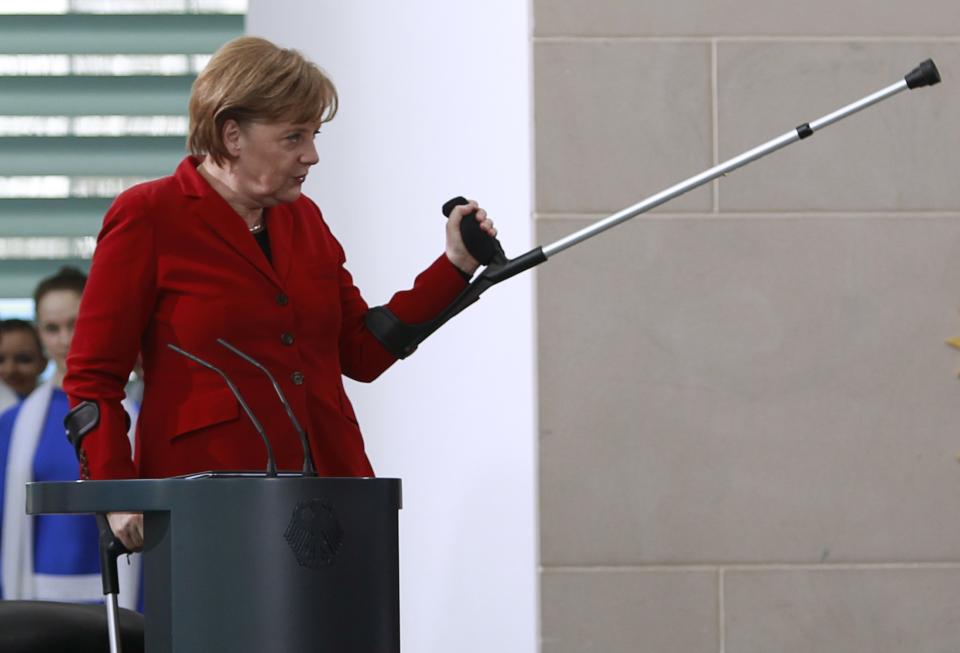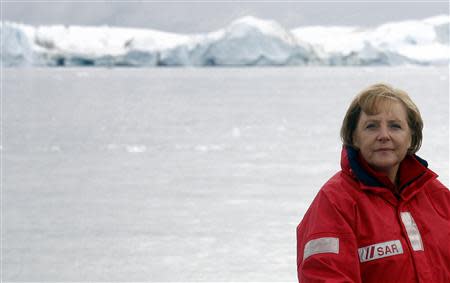Merkel in skiing accident as new German coalition bickers
By Stephen Brown BERLIN (Reuters) - German Chancellor Angela Merkel has broken her pelvis in a cross-country skiing accident, forcing her to call off some foreign visits and official appointments just when she needs to bed down her fractious new coalition government. Merkel, 59, is using crutches after her accident in Switzerland over the Christmas holidays and will have to take it easy for the next three weeks, her spokesman said on Monday. The news about Merkel - who began her third term last month after sealing the "grand coalition" with the center-left Social Democrats - came a week after German ex-Formula One champion Michael Schumacher suffered a far more serious downhill skiing accident and remains in critical condition in France. Merkel's accident had occurred "at low speed" but what had at first seemed to be heavy bruising turned out to be a partial fracture, said spokesman Steffen Seibert. "The chancellor is of course able to work and is in full communication," he added. The conservative chancellor, a keen hiker who prefers cross-country to downhill skiing, must lie down and work from home where possible. She has postponed a visit to Warsaw scheduled for Wednesday and a meeting in Berlin with Luxembourg's new prime minister, Xavier Bettel. But Seibert said she will lead her first cabinet meeting of 2014 on Wednesday. Her government has got off to a rocky start. The right and left have clashed over how quickly to implement policies from their coalition deal, including a minimum wage, a highway toll and a data protection law. Merkel's Bavarian allies also provoked a row by proposing limits to welfare payments for immigrants from Romania and Bulgaria, who from this year have full access to the job markets and social services of the rest of the European Union. CRITICISM OF MERKEL Merkel has also drawn criticism for the planned switch of her recently departed chief of staff, Ronald Pofalla, to a high-paying position as a political lobbyist for state-owned railway operator Deutsche Bahn. News of Pofalla's move, which has not yet been finalized, came just two months after prosecutors opened an investigation into another top Merkel aide, Eckart von Klaeden, over his move to the top lobby job at German carmaker Daimler. Opposition parties and anti-lobby groups have denounced both moves as evidence of a "revolving door" between politics and business in Germany. Seibert said on Monday that Pofalla had told Merkel in late November, in the midst of coalition talks, that he might move to Deutsche Bahn. Merkel had recommended to Pofalla that he take a "cooling-off" period before moving into the new job, said Seibert, who declined to comment on whether the chancellor supports the move. Alexander Kirchner, a union leader who sits on Deutsche Bahn's supervisory board, criticized the silence. "I think it's absurd that the government hasn't said anything," he told Reuters. The rail operator has called a special meeting on January 30 where the Pofalla case is expected to be discussed. With the Pofalla row continuing and cabinet colleagues from Merkel's Christian Democrats, their Bavarian allies in the Christian Social Union and the Social Democrats arguing on a range of issues, Merkel can ill afford to be resting as her doctors have recommended. She will not attend the Davos World Economic Forum later this month, Seibert said - not due to her accident, but because it clashes with plans for a cabinet "retreat" on January 22-23 outside Berlin. But it was unclear whether Merkel would attend that crucial political meeting or will have to postpone it. (Reporting by Stephen Brown; Editing by Noah Barkin and David Stamp)




